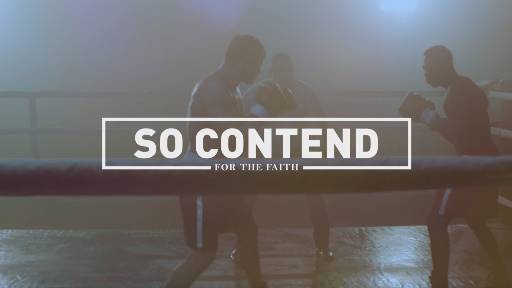-
Fighting For My Faith Series
Contributed by Pat Damiani on Jul 24, 2018 (message contributor)
Summary: My faith is worth fighting for, not fighting about
ENGAGE
An Indiana science teacher promised his class during an active shooter drill that he would sacrifice himself before he would let anything happen to them. On Friday, May 25, 2018, Jason Seaman proved that he meant what he said. That morning he just happened to have a basketball in his hands when a student left class and then returned with two handguns blazing. He hurled the basketball at the shooter and then ran right at him and tackled him to the ground, even after being shot several times. That day Jason Seaman demonstrated by his actions that he was passionate enough about his students to fight for them.
I know that we have a lot of people right here at Thornydale Family Church who are willing to fight for some things that you are passionate about. For some of us those passions really don’t have a lot of eternal value – things like our passion for our favorite sports team or maybe our favorite singer or band, or even our favorite food. But in many cases we would still go to great lengths to pursue those passions.
Then there are some other passions that are much more significant. For Ryan and Natalie Fregoso, and especially for Natalie, their passion for their daughter Gabrielle has led them to fight for her by becoming deeply involved in the PMG Awareness organization. In fact, just last week they were in Denver for the PMGA Convention. As the Vice President and treasurer of that organization, Natalie poured a lot of effort into the planning of that convention as well.
TENSION
So I want you to think for a moment this morning about the people and things in your life that you are passionate enough about that you would be willing to fight for. And while you’re doing that I want you to think about this question:
Are you passionate enough about your faith to fight for it? And if you are, how would you go about actually doing that? Those are a couple questions that we’ll be grappling with this morning.
TRUTH
Today, our sermon series titled “Little Books with a Big Message” takes us to the New Testament where we’ll be studying the book of Jude. It is the next to last book in the Old Testament, right before the book of Revelation, so even though it probably only takes up one page in your Bible, it should be pretty easy to find.
In Greek, the book is titled “Ioudas”, a name that is translated either “Judas” or “Judah” everywhere else it is found in the New Testament. Because the author is certainly not the Judas we are most familiar with – the one of the twelve apostles that betrayed Jesus – I suppose it’s not all that surprising that every major English translation of the Bible calls this book by the shortened form of that name – Jude – in order to avoid any connection to that Judas. So this morning, just to avoid any confusion, I’ll call the author Jude.
Although we can’t be 100% certain, there is good evidence that the author of this letter is Judas, the half-brother of Jesus and brother of James, one of Jesus’ other siblings. (Matthew 13:55). Like his other siblings, Judas certainly had his doubts about Jesus prior to the resurrection - with good reason. If you lived with a brother who was perfect and never did anything wrong, you’d probably grow to resent Him, too. Just think about it, every time that you tried to claim, “It’s Jesus’ fault, He started it”, your parents would just dismiss that claim right away. But after the resurrection, Judas, just like his brother James, became a disciple of Jesus and an important leader in the early church.
Before I read our passage, let me just share a word of caution. We’re going to run into a few verses that are going to seem pretty strange because they refer to events that we just don’t have any record of anywhere else in the Bible. We’ll probably spend some time discussing them during the Bible Roundtable at 11:00, but I don’t have nearly enough time to get into them in any kind of detail this morning, without distracting us from the main idea of this letter. So when we get to the verses that deal with Michael and Moses’ bones or the prophesy of Enoch, please don’t get distracted. With that caveat in mind, go ahead and follow along as I begin reading.
[Read Jude 1-2]
If, in fact, the author is the half-brother of Jesus, it is interesting here that He does not boast in that fact. Instead he calls Himself a servant of Jesus Christ.
The other important thing to note in these opening verses is that he is clearly addressing this letter to fellow disciples of Jesus.

 Sermon Central
Sermon Central


